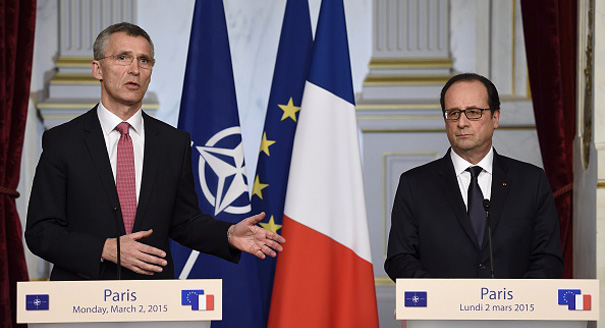France’s main priority at NATO’s July 2016 summit in Warsaw is to preserve a balanced and flexible alliance that is able to respond to different threats along its Eastern and Southern borders. France considers that NATO cannot afford to choose between Europe’s different neighborhoods and acts as an alliance swing state, along with the United States, the UK, and Germany, by playing a decisive role in managing this balance.
From a French perspective, NATO’s relevance and efficiency stem from the alliance’s pragmatic and flexible approach to security crises. Debates about the division between East and South, or about whether the current temporary NATO troops in the East and the Baltics should be made permanent, do not necessarily reinforce transatlantic solidarity. In this respect, France agrees with most of its allies that a geographical division of labor in the alliance would be a threat to NATO’s unity. The crises in the European neighborhoods require a comprehensive response.
The combination of the growth of Russian influence in the South, on the one hand, and the refugee crisis, on the other, has been a unifying element across NATO’s geography. Despite military overstretch, France has shown commitment in both the East and the South and will continue to do so. In addition to 10,000 antiterrorism troops deployed on French national territory and a heavy military engagement in the Sahel, Iraq, and Syria, France has also been actively contributing to the reassurance measures on which NATO decided at its September 2014 summit in Wales, for example by reinforcing its air presence in the Baltics through cooperation with Norway.
In fact, Paris has continuously played a greater role in transatlantic security since reintegrating into NATO’s military command in 2009. For example, France provided 1,200 of the 6,000 troops who participated in NATO’s Steadfast Jazz military exercise in the Baltic states and Poland in November 2013.
Maintaining a balanced and flexible alliance is also critical to preserving France’s strategic autonomy and its ability to defend its interests, either through NATO or the EU. This means that France will pursue its efforts in implementing the Readiness Action Plan on which the alliance decided at its Wales summit, with an emphasis on improved flexibility and responsiveness rather than a permanent presence of NATO troops in Eastern Europe.
This posture, along with the French reluctance about further NATO enlargement beyond Montenegro, is also explained by France’s willingness to avoid escalating tensions with Russia. France maintains that keeping the door open to Ukraine will inevitably lead to Russian reactions, and that NATO allies will have to be prepared and willing to engage in escalation. This stance often leads Eastern European allies to criticize France for focusing too much on dialogue with Russia, at the expense of the two other D’s, deterrence and defense.
France will, however, remain fully committed to strengthening NATO’s deterrence capabilities, across the full spectrum, with an emphasis on the alliance’s nuclear deterrent. France believes that not all threats can be deterred solely by pre-positioning conventional forces in the East and by emphasizing ballistic missile defense (BMD), to the extent that such defense weakens nuclear deterrence. Rather, Paris sees BMD as a complement to nuclear forces, based on the position expressed at NATO’s 2012 summit in Chicago.
In the fight against the self-proclaimed Islamic State, France does not believe NATO should play a leading role. Instead, Paris considers NATO a toolbox with which willing countries can use alliance resources—especially NATO-owned drones and, potentially, airborne warning and control system (AWACS) capabilities—to conduct counterterrorism operations, and can benefit from NATO expertise on training and regional capacity building in the Middle East and North Africa (MENA).
The multiple crises in the MENA region stem from fundamental political instability, and a strategy to address them cannot rely primarily on the use of NATO forces. That said, operations outside NATO such as the French-led operation in Mali in 2013–2014 have shown positive results and proved that alternative frameworks can be successful.
France has also deepened its bilateral defense cooperation with the United States. Yet Paris acknowledges that shifts in U.S. foreign policy require all European powers to step up and take more strategic responsibilities, including within NATO. For France, the 2011 operation in Libya was an eye-opener. “The world is changing,” then French president Nicolas Sarkozy warned on August 31, 2011. “[U.S.] President Obama has presented a new vision of American military involvement whose implication is that Europeans must assume more of their responsibilities. If we don’t draw the consequences from that, if we don’t consider the realities in the world, Europeans will experience a rude awakening.”
In this context, France will continue to encourage its closest European allies, including Germany, to devote the forces, resources, and military efforts necessary to implement their summit decisions. “Let’s not rely on another power, even a friendly one, to do away with terrorism,” French President François Hollande reminded readers in an interview to the German newspaper Bild on April 6, clearly referring to the United States.
Paris will reiterate the importance of significantly improving EU-NATO cooperation not only to better address the multiple crises in the MENA region but also to build resilience in European societies. Boosting counterterrorism, sharing information and intelligence for better protection, and reinforcing common approaches to maritime strategy and cyberdefense will remain at the heart of the French agenda and policy initiatives in Warsaw.
Finally, France regularly reminds its allies about the limits of NATO’s scope of action, and the alliance should address this issue on the road to the Warsaw summit. The challenge posed by hybrid warfare, although it includes a strong military component, cannot be dealt with by NATO alone and requires a more comprehensive transatlantic response. After all, transatlantic resilience is based on the political, economic, and normative powers of individual partners and of the EU as much as on their defense capabilities.
Alexandra de Hoop Scheffer is a senior transatlantic fellow and director of the Paris office of the German Marshall Fund of the United States.





.jpg)
